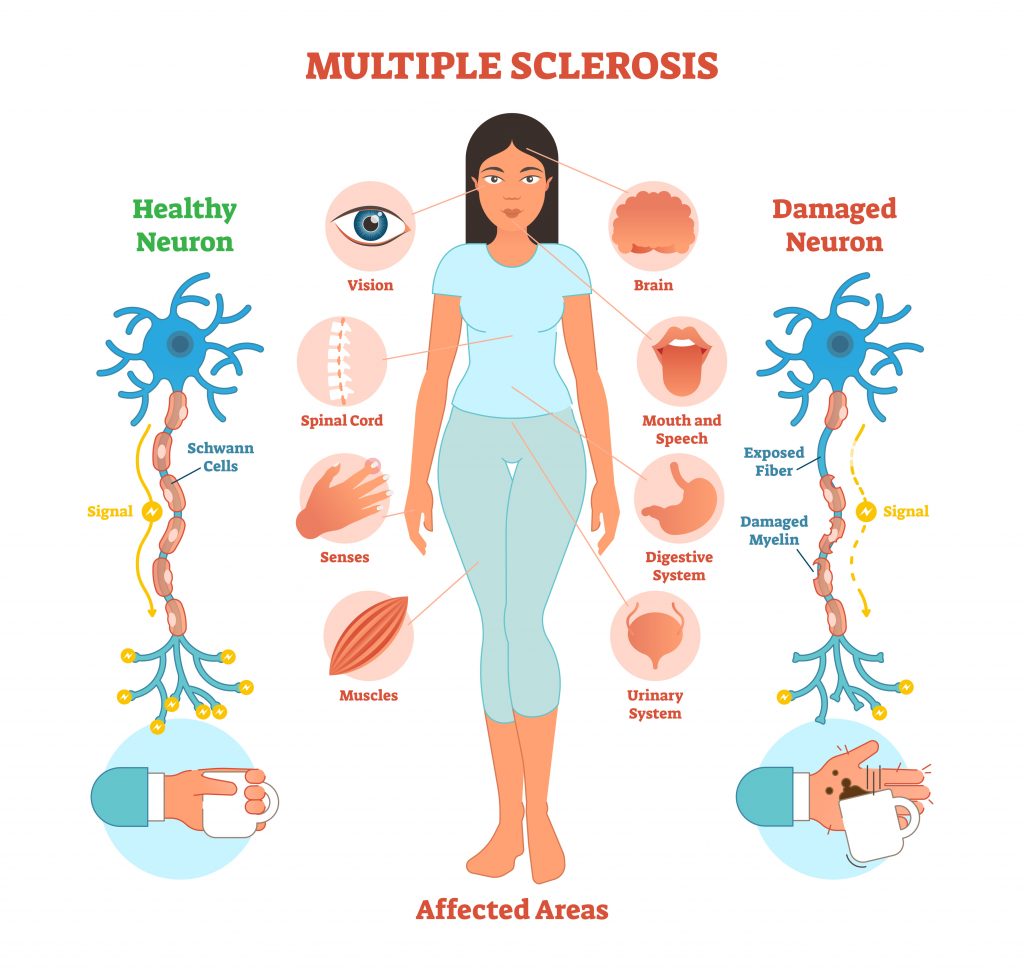Do you know someone with Multiple Sclerosis (MS)? A diagnosis of multiple sclerosis is frightening and calls for a reevaluation of priorities, a redefining of self, and relearning who you are. Life with MS is challenging, and change is hard, especially when it’s happening inside your body. MS can have an impact on your social, financial, and personal and professional situations that leaves you questioning yourself and your abilities. Acclimating to a “new normal” can impact your confidence and self esteem.
What Is Multiple Sclerosis?
What is Multiple Sclerosis? MS is a chronic, inflammatory, autoimmune disease of the central nervous system (CNS) that currently has no cure. MS symptoms vary widely from person to person and depend upon which areas of the CNS are affected. Cognitive problems and motor function issues are among the most common. Many people with MS will eventually develop some degree of disability, which can take away from their sense of independence.

Psychological, Social, and Emotional Effects of Multiple Sclerosis
The impact of MS on emotional health can interfere with your sense of self. MS has a varied list of mental and physical symptoms that have indirect and direct effects on mental health and emotions: Structural brain changes caused by MS and the treatments prescribed for MS can trigger or contribute to psychological issues, including psychiatric and mood disorders, emotional lability, and more.
From Sleep Issues
About half of all people with MS experience disordered sleep of some sort. MS sleep trouble may be due to pain or anxiety, or it may be a side effect of medication. Sleep deprivation can deplete a person’s energy leaving them with lower capacity to manage MS’s symptoms, inadequate energy levels, intensified pain perception, and fatigue. Sleep deprivation can also affect mental health, lower the capacity to regulate emotions, and exacerbate depression and anxiety. All of these issues may compound to leave you feeling less like yourself. How to get more sleep.
From Weight Fluctuations
Add to the list of ways your body as you know it may change, MS and weight gain or weight loss are common. A number of factors can contribute to weight changes, including anxiety, limited mobility, and changes in appetite. MS symptoms also often make exercise difficult, and the side effects of medications used to treat MS can contribute to weight gain. For people with MS, a change in physical appearance can sometimes affect confidence levels.
From Stress
Life is stressful during the best of times. Being diagnosed with and managing a chronic illness like MS can add even more stress. Research indicates a link between chronic stress and more severe MS symptoms. Scientists believe stress can lead to a higher rate of MS relapse. Managing the increased stress of having MS is an important part of managing the condition and maintaining your quality of life.
Tips for Dealing with Emotional Impacts of Multiple Sclerosis
There are many things that you can do to help you feel like your best self with MS. Here are just a few:
- Consider psychotherapy. Whether that looks like group therapy, one-to-one talk therapy, or cognitive behavioral therapy, professional guidance can be invaluable when coping with life with MS.
- Learn healthy ways to cope with stressful events, such as through mindfulness.
- Exercise — it helps encourage positive thinking, reduce depression, and mitigate anxiety.
- Join a support group, virtually or in real life, and gain valuable support from others who are living with MS too.
- Try to be compassionate with yourself and others, even in those moments that you lose your patience, get frustrated, or feel any number of the totally normal feelings that you may experience in life with MS.
By Nyaka Mwanza





















